兰亭集序-林语堂翻译
《兰亭集序》林语堂版英译文
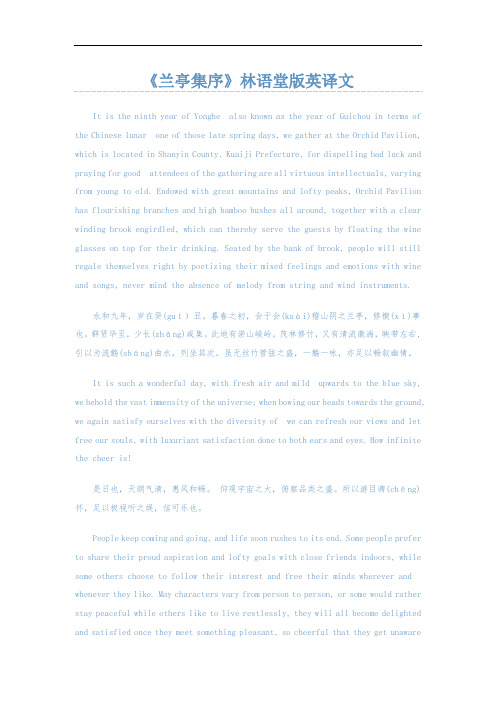
It is the ninth year of Yonghe also known as the year of Guichou in terms of the Chinese lunar one of those late spring days, we gather at the Orchid Pavilion, which is located in Shanyin County, Kuaiji Prefecture, for dispelling bad luck and praying for good attendees of the gathering are all virtuous intellectuals, varying from young to old. Endowed with great mountains and lofty peaks, Orchid Pavilion has flourishing branches and high bamboo bushes all around, together with a clear winding brook engirdled, which can thereby serve the guests by floating the wine glasses on top for their drinking. Seated by the bank of brook, people will still regale themselves right by poetizing their mixed feelings and emotions with wine and songs, never mind the absence of melody from string and wind instruments.永和九年,岁在癸(guǐ)丑。
兰亭集序原文及译文

兰亭集序原文及译文,永和九年,岁在癸丑,暮春之初,会于会稽山阴之兰亭,修禊事也。
群贤毕至,少长咸集。
永和九年,岁在癸丑,暮春之初,会于会(kuài)稽山阴之兰亭,修禊(xì)事也。
群贤毕至,少长(zhǎng)咸集。
此地有崇山峻岭,茂林修竹,又有清流激湍,映带左右,引以为流觞(shāng)曲水,列坐其次。
虽无丝竹管弦之盛,一觞一咏,亦足以畅叙幽情。
是日也,天朗气清,惠风和畅。
仰观宇宙之大,俯察品类之盛,所以游目骋怀,足以极视听之娱,信可乐也。
夫人之相与,俯仰一世。
或取诸怀抱,悟言一室之内;或因寄所托,放浪形骸之外。
虽趣舍万殊,静躁不同,当其欣于所遇,暂得于己,快然自足,不知老之将至;及其所之既倦,情随事迁,感慨系之矣。
向之所欣,俯仰之间,已为陈迹,犹不能不以之兴怀,况修短随化,终期于尽!古人云:“死生亦大矣”(41),岂不痛哉!每览昔人兴感之由,若合一契,未尝不临文嗟悼(jiē dào),不能喻之于怀。
固知一死生为虚诞,齐彭殇(shāng)为妄作。
后之视今,亦犹今之视昔,悲夫!故列叙时人,录其所述,虽世殊事异,所以兴怀,其致一也。
后之览者,亦将有感于斯文。
译文永和九年,时在癸丑之年,三月上旬,我们会集在会稽山阴的兰亭,为了做禊事。
众多贤才都汇聚到这里,年龄大的小的都聚集在这里。
兰亭这地方有高峻的山峰,茂盛的树林,高高的竹子。
又有清澈湍急的溪流,(如同青罗带一般)环绕在亭子的四周,引(溪水)作为流觞的曲水,排列坐在曲水旁边,虽然没有演奏音乐的盛况,喝点酒作点诗,也足够来畅快叙述幽深内藏的感情了。
这一天,天气晴朗,空气清新,和风温暖,仰首观览到宇宙的浩大,俯看观察大地上万物的繁多,用来舒展眼力,开阔胸怀,足够来极尽视听的欢娱,实在很快乐。
人与人的交往,很快就度过了一生,有的人在室内长谈自己的抱负胸怀;有的人就着自己所爱好的事物,寄托自己的情怀,不受约束,放纵无羁地生活。
虽然各有各的爱好,安静与躁动各不相同,但当他们对所接触的事物感到高兴时,一时感到自得.感到高兴和满足,(竟然)不知道衰老将要到来。
兰亭序
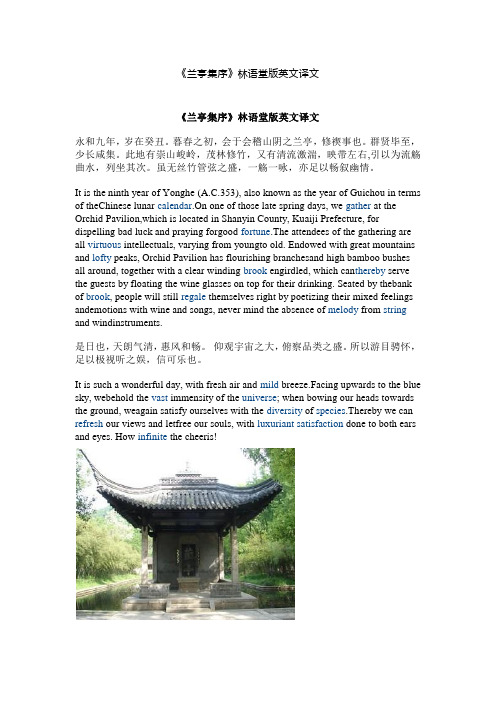
《兰亭集序》林语堂版英文译文《兰亭集序》林语堂版英文译文永和九年,岁在癸丑。
暮春之初,会于会稽山阴之兰亭,修禊事也。
群贤毕至,少长咸集。
此地有崇山峻岭,茂林修竹,又有清流激湍,映带左右,引以为流觞曲水,列坐其次。
虽无丝竹管弦之盛,一觞一咏,亦足以畅叙幽情。
It is the ninth year of Yonghe (A.C.353), also known as the year of Guichou in terms of theChinese lunar calendar.On one of those late spring days, we gather at the Orchid Pavilion,which is located in Shanyin County, Kuaiji Prefecture, for dispelling bad luck and praying forgood fortune.The attendees of the gathering are all virtuous intellectuals, varying from youngto old. Endowed with great mountains and lofty peaks, Orchid Pavilion has flourishing branchesand high bamboo bushes all around, together with a clear winding brook engirdled, which can thereby serve the guests by floating the wine glasses on top for their drinking. Seated by thebank of brook, people will still regale themselves right by poetizing their mixed feelings andemotions with wine and songs, never mind the absence of melody from string and windinstruments.是日也,天朗气清,惠风和畅。
兰亭集序原文翻译

兰亭集序原文翻译阅读过兰亭集序以后,我们能够领略到作者积极的人生态度,因此要认真学习。
以下是由小编为大家整理的“兰亭集序原文翻译”,仅供参考,欢迎大家阅读。
兰亭集序原文永和九年,岁在癸丑,暮春之初,会于会稽山阴之兰亭,修禊事也。
群贤毕至,少长咸集。
此地有崇山峻岭,茂林修竹;又有清流激湍,映带左右,引以为流觞曲水,列坐其次。
虽无丝竹管弦之盛,一觞一咏,亦足以畅叙幽情。
是日也,天朗气清,惠风和畅,仰观宇宙之大,俯察品类之盛,所以游目骋怀,足以极视听之娱,信可乐也。
夫人之相与,俯仰一世,或取诸怀抱,悟言一室之内;或因寄所托,放浪形骸之外。
虽趣舍万殊,静躁不同,当其欣于所遇,暂得于己,快然自足,不知老之将至。
及其所之既倦,情随事迁,感慨系之矣。
向之所欣,俯仰之间,已为陈迹,犹不能不以之兴怀。
况修短随化,终期于尽。
古人云:“死生亦大矣。
”岂不痛哉!(不知老之将至一作:曾不知老之将至)每览昔人兴感之由,若合一契,未尝不临文嗟悼,不能喻之于怀。
固知一死生为虚诞,齐彭殇为妄作。
后之视今,亦犹今之视昔。
悲夫!故列叙时人,录其所述,虽世殊事异,所以兴怀,其致一也。
后之览者,亦将有感于斯文。
兰亭集序翻译永和九年,岁星在癸丑,三月初三日,我们在会稽郡山阴县的兰亭集会,举行祓禊活动。
许多著名人士统统来了,年轻的和年长的都聚集在一起。
这专访有高峻的山岭主,茂盛的树林,外长的竹子。
还有澄清的急流,在左右映衬环绕,引来作为流觞的曲水。
大家依次坐在水边,虽然没有琴、瑟、箫、笛演奏的盛况,但边喝酒边赋诗,也足够畅叙衷情。
这一天,天色晴朗,空气清新,和风温暖。
抬头看到天空的广阔,低头看到万物的众多,藉此放眼观赏,开畅胸怀,可以尽情享受耳目的乐趣,确实是欢乐的。
人与人的相处,时间很短暂。
有的把自己的抱负倾吐出来,和朋友在一间房屋里谈论;有的凭借爱好的事物寄托志趣,过着放纵性情的生活。
虽然各人谋求的和抛弃的千差万别,性格的安静和浮躁也不一样,可是当他们对接触到的事物感到高兴,被自己暂取得,就愉快地自满起来,不知道衰老即将来到。
兰亭集序原文翻译
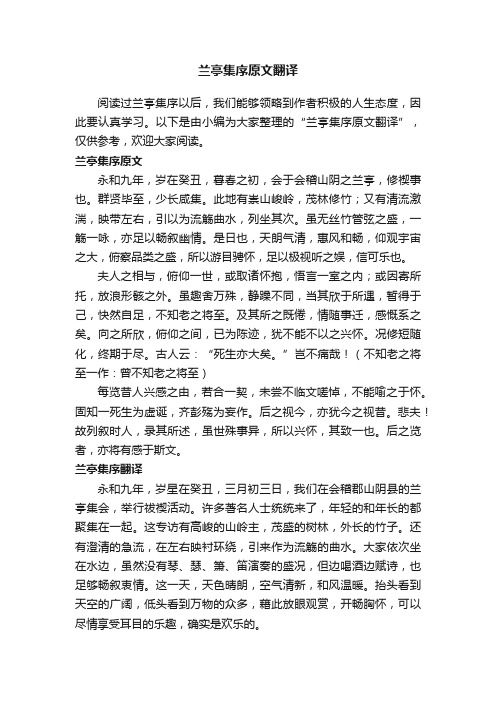
兰亭集序原文翻译阅读过兰亭集序以后,我们能够领略到作者积极的人生态度,因此要认真学习。
以下是由小编为大家整理的“兰亭集序原文翻译”,仅供参考,欢迎大家阅读。
兰亭集序原文永和九年,岁在癸丑,暮春之初,会于会稽山阴之兰亭,修禊事也。
群贤毕至,少长咸集。
此地有崇山峻岭,茂林修竹;又有清流激湍,映带左右,引以为流觞曲水,列坐其次。
虽无丝竹管弦之盛,一觞一咏,亦足以畅叙幽情。
是日也,天朗气清,惠风和畅,仰观宇宙之大,俯察品类之盛,所以游目骋怀,足以极视听之娱,信可乐也。
夫人之相与,俯仰一世,或取诸怀抱,悟言一室之内;或因寄所托,放浪形骸之外。
虽趣舍万殊,静躁不同,当其欣于所遇,暂得于己,快然自足,不知老之将至。
及其所之既倦,情随事迁,感慨系之矣。
向之所欣,俯仰之间,已为陈迹,犹不能不以之兴怀。
况修短随化,终期于尽。
古人云:“死生亦大矣。
”岂不痛哉!(不知老之将至一作:曾不知老之将至)每览昔人兴感之由,若合一契,未尝不临文嗟悼,不能喻之于怀。
固知一死生为虚诞,齐彭殇为妄作。
后之视今,亦犹今之视昔。
悲夫!故列叙时人,录其所述,虽世殊事异,所以兴怀,其致一也。
后之览者,亦将有感于斯文。
兰亭集序翻译永和九年,岁星在癸丑,三月初三日,我们在会稽郡山阴县的兰亭集会,举行祓禊活动。
许多著名人士统统来了,年轻的和年长的都聚集在一起。
这专访有高峻的山岭主,茂盛的树林,外长的竹子。
还有澄清的急流,在左右映衬环绕,引来作为流觞的曲水。
大家依次坐在水边,虽然没有琴、瑟、箫、笛演奏的盛况,但边喝酒边赋诗,也足够畅叙衷情。
这一天,天色晴朗,空气清新,和风温暖。
抬头看到天空的广阔,低头看到万物的众多,藉此放眼观赏,开畅胸怀,可以尽情享受耳目的乐趣,确实是欢乐的。
人与人的相处,时间很短暂。
有的把自己的抱负倾吐出来,和朋友在一间房屋里谈论;有的凭借爱好的事物寄托志趣,过着放纵性情的生活。
虽然各人谋求的和抛弃的千差万别,性格的安静和浮躁也不一样,可是当他们对接触到的事物感到高兴,被自己暂取得,就愉快地自满起来,不知道衰老即将来到。
兰亭集序原文翻译
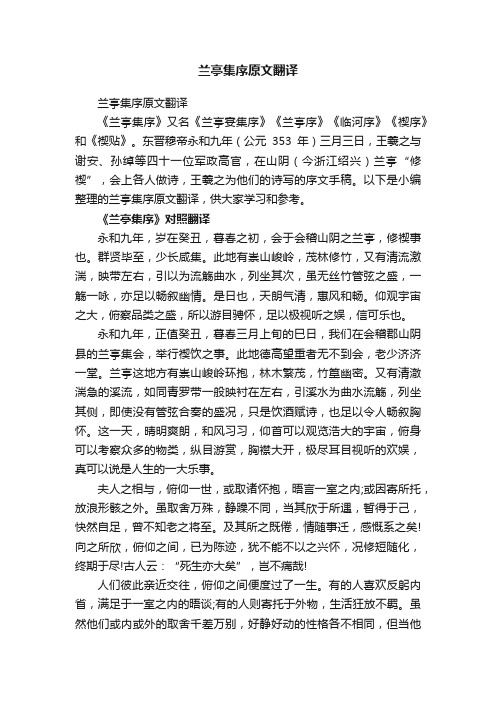
兰亭集序原文翻译兰亭集序原文翻译《兰亭集序》又名《兰亭宴集序》《兰亭序》《临河序》《禊序》和《禊贴》。
东晋穆帝永和九年(公元353年)三月三日,王羲之与谢安、孙绰等四十一位军政高官,在山阴(今浙江绍兴)兰亭“修禊”,会上各人做诗,王羲之为他们的诗写的序文手稿。
以下是小编整理的兰亭集序原文翻译,供大家学习和参考。
《兰亭集序》对照翻译永和九年,岁在癸丑,暮春之初,会于会稽山阴之兰亭,修禊事也。
群贤毕至,少长咸集。
此地有崇山峻岭,茂林修竹,又有清流激湍,映带左右,引以为流觞曲水,列坐其次,虽无丝竹管弦之盛,一觞一咏,亦足以畅叙幽情。
是日也,天朗气清,惠风和畅。
仰观宇宙之大,俯察品类之盛,所以游目骋怀,足以极视听之娱,信可乐也。
永和九年,正值癸丑,暮春三月上旬的巳日,我们在会稽郡山阴县的兰亭集会,举行禊饮之事。
此地德高望重者无不到会,老少济济一堂。
兰亭这地方有崇山峻岭环抱,林木繁茂,竹篁幽密。
又有清澈湍急的溪流,如同青罗带一般映衬在左右,引溪水为曲水流觞,列坐其侧,即使没有管弦合奏的盛况,只是饮酒赋诗,也足以令人畅叙胸怀。
这一天,晴明爽朗,和风习习,仰首可以观览浩大的宇宙,俯身可以考察众多的物类,纵目游赏,胸襟大开,极尽耳目视听的欢娱,真可以说是人生的一大乐事。
夫人之相与,俯仰一世,或取诸怀抱,晤言一室之内;或因寄所托,放浪形骸之外。
虽取舍万殊,静躁不同,当其欣于所遇,暂得于己,快然自足,曾不知老之将至。
及其所之既倦,情随事迁,感慨系之矣!向之所欣,俯仰之间,已为陈迹,犹不能不以之兴怀,况修短随化,终期于尽!古人云:“死生亦大矣”,岂不痛哉!人们彼此亲近交往,俯仰之间便度过了一生。
有的人喜欢反躬内省,满足于一室之内的晤谈;有的人则寄托于外物,生活狂放不羁。
虽然他们或内或外的取舍千差万别,好静好动的性格各不相同,但当他们遇到可喜的事情,得意于一时,感到欣然自足时,竟然都会忘记衰老即将要到来之事。
等到对已获取的东西发生厌倦,情事变迁,又不免会引发无限的感慨。
《兰亭集序》(林语堂两种英文翻译版本)
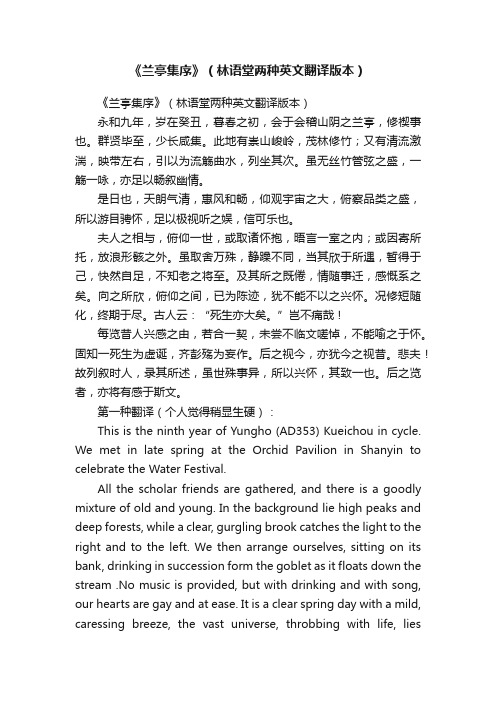
《兰亭集序》(林语堂两种英文翻译版本)《兰亭集序》(林语堂两种英文翻译版本)永和九年,岁在癸丑,暮春之初,会于会稽山阴之兰亭,修禊事也。
群贤毕至,少长咸集。
此地有崇山峻岭,茂林修竹;又有清流激湍,映带左右,引以为流觞曲水,列坐其次。
虽无丝竹管弦之盛,一觞一咏,亦足以畅叙幽情。
是日也,天朗气清,惠风和畅,仰观宇宙之大,俯察品类之盛,所以游目骋怀,足以极视听之娱,信可乐也。
夫人之相与,俯仰一世,或取诸怀抱,晤言一室之内;或因寄所托,放浪形骸之外。
虽取舍万殊,静躁不同,当其欣于所遇,暂得于己,快然自足,不知老之将至。
及其所之既倦,情随事迁,感慨系之矣。
向之所欣,俯仰之间,已为陈迹,犹不能不以之兴怀。
况修短随化,终期于尽。
古人云:“死生亦大矣。
”岂不痛哉!每览昔人兴感之由,若合一契,未尝不临文嗟悼,不能喻之于怀。
固知一死生为虚诞,齐彭殇为妄作。
后之视今,亦犹今之视昔。
悲夫!故列叙时人,录其所述,虽世殊事异,所以兴怀,其致一也。
后之览者,亦将有感于斯文。
第一种翻译(个人觉得稍显生硬):This is the ninth year of Yungho (AD353) Kueichou in cycle. We met in late spring at the Orchid Pavilion in Shanyin to celebrate the Water Festival.All the scholar friends are gathered, and there is a goodly mixture of old and young. In the background lie high peaks and deep forests, while a clear, gurgling brook catches the light to the right and to the left. We then arrange ourselves, sitting on its bank, drinking in succession form the goblet as it floats down the stream .No music is provided, but with drinking and with song, our hearts are gay and at ease. It is a clear spring day with a mild, caressing breeze, the vast universe, throbbing with life, liesspread before us, entertaining the eye and pleasing the spirit and all the senses. It is perfect.Now when men come together, they let their thoughts travel to the present. Some enjoy a quiet conversation indoors and others play about outdoors, occupied with what they love. The forms of annulment differ according to temperaments, but when each has found what he wants, he is happy and never feels old, then as time passes on and one is tired of his pursuits, it seems that what fascinated him not so long ago has become a mere memory. What a thought! Besides, whether individually we live a long life or not, we all return to nothingness. The ancient regarded death as the great question. Is it not sad to think of it?I often thought that the people of the past lived and felt exactly as we of today. Whenever I read their writing, I felt this way and was seized with its pathos. It is cool comfort to say that life and death are different phases of the same thing and that a long span of life or a short one does not matter. Alas! The people of the future will look upon us as we look upon those who have gone before us. Hence I have recorded here those present and what they said. Ages may pass and times may change, but the human sentiments will be the same; I know that future readers who set their eyes upon these words will be affected in the same way.下面是第二种翻译(这个版本可能更好):The Orchid PavilionIn the ninth year of the reign Yungho[A.D. 353] in the beginning of late spring we met at the Orchid Pavilion in Shanyin of Kweich'i for the Water Festival, to wash away the evil spirits.Here are gathered all the illustrious persons and assembled both the old and the young. Here aretall mountains and majestic peaks, trees with thick foliage and tall bamboos. Here are also clear streams and gurgling rapids, catching one's eye from the right and left. We group ourselves in order, sitting by the waterside, and drinking in succession from a cup floating down the curving stream; and although there is no music from string and wood-wind instruments, yet with alternate singing and drinking, we are well disposed to thoroughly enjoy a quiet intimate conversation.Today the sky is clear, the air is fresh and the kind breeze is mild. Truly enjoyable it is sit to watch the immense universe above and the myriad things below, traveling over the entire landscape with our eyes and allowing our sentiments to roam about at will, thus exhausting the pleasures of the eye and the ear.Now when people gather together to surmise life itself, some sit and talk and unburden their thoughts in the intimacy of a room, and some, overcome by a sentiment, soar forth into a world beyond bodily realities. Although we select our pleasures according to our inclinations—some noisy and rowdy, and others quiet and sedate—yet when we have found that which pleases us, we are all happy and contented, to the extent of forgetting that we are growing old. And then, when satiety follows satisfaction, and with the change of circumstances, change also our whims and desires, there then arises a feeling of poignant regret. In the twinkling of an eye, the objects of our former pleasures have become things of the past, still compelling in us moods of regretful memory. Furthermore, although our lives may be long or short, eventually we all end in nothingness. "Great indeed are life and death", said the ancients. Ah! What sadness!I often study the joys and regrets of the ancient people, andas I lean over their writings and see that they were moved exactly as ourselves, I am often overcome by a feeling of sadness and compassion, and would like to make those things clear to me. Well I know it is a lie to say that life and death are the same thing, and that longevity and early death make no difference! Alas! As we of the present look upon those of the past, so will posterity look upon our present selves. Therefore, have I put down a sketch of these contemporaries and their sayings at this feast, and although time and circumstances may change, the way they will evoke our moods of happiness and regret will remain the same. What will future readers feel when they cast their eyes upon this writing.。
《兰亭集序》林语堂英译文

《兰亭集序》林语堂英译文It is the ninth year of Yonghe (A.C.353), also known as the year of Guichou in terms of the Chinese lunar calendar.On one of those late spring days, we gather at the Orchid Pavilion, which is located in Shanyin County, Kuaiji Prefecture, for dispelling bad luck and praying for good fortune.The attendees of the gathering are all virtuous intellectuals, varying from young to old. Endowed with great mountains and lofty peaks, Orchid Pavilion has flourishing branches and high bamboo bushes all around, together with a clear winding brook engirdled, which can thereby serve the guests by floating the wine glasses on top for their drinking. Seated by the bank of brook, people will still regale themselves right by poetizing their mixed feelings and emotions with wine and songs, never mind the absence of melody from string and wind instruments.It is such a wonderful day, with fresh air and mild breeze.Facing upwards to the blue sky, we behold the vast immensity of the universe; when bowing our heads towards the ground, we again satisfy ourselves with the diversity of species.Thereby we can refresh our views and let free our souls,with luxuriant satisfaction done to both ears and eyes. How infinite the cheer is!永和九年,岁正在癸(guǐ)丑。
课文《兰亭集序》原文及注释译文
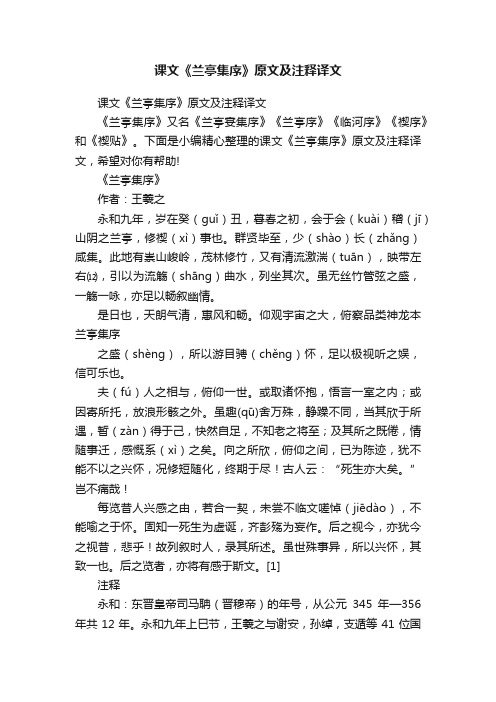
课文《兰亭集序》原文及注释译文课文《兰亭集序》原文及注释译文《兰亭集序》又名《兰亭宴集序》《兰亭序》《临河序》《禊序》和《禊贴》。
下面是小编精心整理的课文《兰亭集序》原文及注释译文,希望对你有帮助!《兰亭集序》作者:王羲之永和九年,岁在癸(guǐ)丑,暮春之初,会于会(kuài)稽(jī)山阴之兰亭,修禊(xì)事也。
群贤毕至,少(shào)长(zhǎng)咸集。
此地有崇山峻岭,茂林修竹,又有清流激湍(tuān),映带左右⑿,引以为流觞(shāng)曲水,列坐其次。
虽无丝竹管弦之盛,一觞一咏,亦足以畅叙幽情。
是日也,天朗气清,惠风和畅。
仰观宇宙之大,俯察品类神龙本兰亭集序之盛(shèng),所以游目骋(chěng)怀,足以极视听之娱,信可乐也。
夫(fú)人之相与,俯仰一世。
或取诸怀抱,悟言一室之内;或因寄所托,放浪形骸之外。
虽趣(qū)舍万殊,静躁不同,当其欣于所遇,暂(zàn)得于己,快然自足,不知老之将至;及其所之既倦,情随事迁,感慨系(xì)之矣。
向之所欣,俯仰之间,已为陈迹,犹不能不以之兴怀,况修短随化,终期于尽!古人云:“死生亦大矣。
”岂不痛哉!每览昔人兴感之由,若合一契,未尝不临文嗟悼(jiēdào),不能喻之于怀。
固知一死生为虚诞,齐彭殇为妄作。
后之视今,亦犹今之视昔,悲乎!故列叙时人,录其所述。
虽世殊事异,所以兴怀,其致一也。
后之览者,亦将有感于斯文。
[1]注释永和:东晋皇帝司马聃(晋穆帝)的年号,从公元345年—356年共12年。
永和九年上巳节,王羲之与谢安,孙绰,支遁等41位国家顶级军政明星在兰亭集会,举行禊礼,饮酒赋诗,事后将作品结为一集,由王羲之写了这篇序总述其事。
暮春:阴历三月。
暮,晚。
会[huì]于会[kuài]稽:会:集会。
会稽,郡名,今浙江绍兴。
山阴:今绍兴越城区。
《兰亭集序》原文及翻译

《兰亭集序》原文及翻译《兰亭集序》原文及翻译无论在学习、工作或是生活中,大家总少不了接触文言文吧,借助文言文人们可以反映客观事物、表达思想感情、传递知识信息。
以下是小编收集整理的《兰亭集序》原文及翻译,欢迎阅读与收藏。
《兰亭集序》原文及翻译 1兰亭集序原文:永和九年,岁在癸(guǐ)丑,暮春之初,会于会稽(kuài jī)山阴之兰亭,修禊(xì)事也。
群贤毕至,少长咸集。
此地有崇山峻岭,茂林修竹,又有清流激湍(tuān),映带左右。
引以为流觞(shāng)曲( qū)水,列坐其次,虽无丝竹管弦之盛,一觞(shang)一咏,亦足以畅叙幽情。
是日也,天朗气清,惠风和畅。
仰观宇宙之大,俯察品类之盛,所以游目骋(chěng)怀,足以极视听之娱,信可乐也。
夫人之相与,俯仰一世。
或取诸怀抱,晤言一室之内;或因寄所托,放浪形骸(hái)之外。
虽趣(qǔ)舍万殊,静躁不同,当其欣于所遇,暂得于己,怏然自足,不知老之将至。
及其所之既倦,情随事迁,感慨系(xì)之矣。
向之所欣,俯仰之间,已为陈迹,犹不能不以之兴怀。
况修短随化,终期于尽。
古人云:"死生亦大矣。
"岂不痛哉!每览昔人兴感之由,若合一契,未尝不临文嗟(jiē)悼,不能喻之于怀。
固知一死生为虚诞,齐彭殇(shāng)为妄作。
后之视今,亦犹今之视昔,悲夫!故列叙时人,录其所述。
虽世殊事异,所以兴怀,其致一也。
后之览者,亦将有感于斯文。
兰亭集序翻译:永和九年,即癸丑年,三月之初,(名士们)在会稽郡山北面的兰亭聚会,到水边进行消灾求福的活动。
许多有声望有才气的人都来了,有年轻的,也有年长的。
这里有高大的山和险峻的岭,有茂密的树林和高高的竹子,又有清水急流,(在亭的)左右辉映环绕。
把水引到(亭中)的环形水渠里来,让酒杯飘流水上(供人们取饮)。
人们在曲水旁边排列而坐,虽然没有管弦齐奏的盛况,(可是)一边饮酒一边赋诗,也足以痛快地表达各自埋藏在心中的情怀。
高一语文必修课本《兰亭集序》原文及翻译
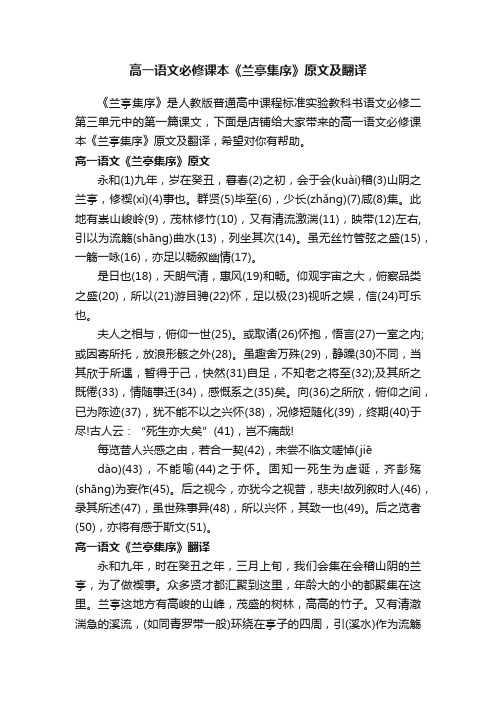
高一语文必修课本《兰亭集序》原文及翻译《兰亭集序》是人教版普通高中课程标准实验教科书语文必修二第三单元中的第一篇课文,下面是店铺给大家带来的高一语文必修课本《兰亭集序》原文及翻译,希望对你有帮助。
高一语文《兰亭集序》原文永和(1)九年,岁在癸丑,暮春(2)之初,会于会(kuài)稽(3)山阴之兰亭,修禊(xì)(4)事也。
群贤(5)毕至(6),少长(zhǎng)(7)咸(8)集。
此地有崇山峻岭(9),茂林修竹(10),又有清流激湍(11),映带(12)左右,引以为流觞(shāng)曲水(13),列坐其次(14)。
虽无丝竹管弦之盛(15),一觞一咏(16),亦足以畅叙幽情(17)。
是日也(18),天朗气清,惠风(19)和畅。
仰观宇宙之大,俯察品类之盛(20),所以(21)游目骋(22)怀,足以极(23)视听之娱,信(24)可乐也。
夫人之相与,俯仰一世(25)。
或取诸(26)怀抱,悟言(27)一室之内;或因寄所托,放浪形骸之外(28)。
虽趣舍万殊(29),静躁(30)不同,当其欣于所遇,暂得于己,快然(31)自足,不知老之将至(32);及其所之既倦(33),情随事迁(34),感慨系之(35)矣。
向(36)之所欣,俯仰之间,已为陈迹(37),犹不能不以之兴怀(38),况修短随化(39),终期(40)于尽!古人云:“死生亦大矣”(41),岂不痛哉!每览昔人兴感之由,若合一契(42),未尝不临文嗟悼(jiēdào)(43),不能喻(44)之于怀。
固知一死生为虚诞,齐彭殇(shāng)为妄作(45)。
后之视今,亦犹今之视昔,悲夫!故列叙时人(46),录其所述(47),虽世殊事异(48),所以兴怀,其致一也(49)。
后之览者(50),亦将有感于斯文(51)。
高一语文《兰亭集序》翻译永和九年,时在癸丑之年,三月上旬,我们会集在会稽山阴的兰亭,为了做禊事。
众多贤才都汇聚到这里,年龄大的小的都聚集在这里。
兰亭集序原文翻译

兰亭集序原文翻译《兰亭集序》又名《兰亭宴集序》《兰亭序》《临河序》《禊序》和《禊贴》。
东晋穆帝永和九年(公元353年)三月三日,王羲之与谢安、孙绰等四十一位军政高官,在山阴(今浙江绍兴)兰亭“修禊”,会上各人做诗,王羲之为他们的诗写的序文手稿。
以下是小编整理的兰亭集序原文翻译,供大家学习和参考。
《兰亭集序》对照翻译永和九年,岁在癸丑,暮春之初,会于会稽山阴之兰亭,修禊事也。
群贤毕至,少长咸集。
此地有崇山峻岭,茂林修竹,又有清流激湍,映带左右,引以为流觞曲水,列坐其次,虽无丝竹管弦之盛,一觞一咏,亦足以畅叙幽情。
是日也,天朗气清,惠风和畅。
仰观宇宙之大,俯察品类之盛,所以游目骋怀,足以极视听之娱,信可乐也。
永和九年,正值癸丑,暮春三月上旬的巳日,我们在会稽郡山阴县的兰亭集会,举行禊饮之事。
此地德高望重者无不到会,老少济济一堂。
兰亭这地方有崇山峻岭环抱,林木繁茂,竹篁幽密。
又有清澈湍急的溪流,如同青罗带一般映衬在左右,引溪水为曲水流觞,列坐其侧,即使没有管弦合奏的盛况,只是饮酒赋诗,也足以令人畅叙胸怀。
这一天,晴明爽朗,和风习习,仰首可以观览浩大的宇宙,俯身可以考察众多的物类,纵目游赏,胸襟大开,极尽耳目视听的欢娱,真可以说是人生的一大乐事。
夫人之相与,俯仰一世,或取诸怀抱,晤言一室之内;或因寄所托,放浪形骸之外。
虽取舍万殊,静躁不同,当其欣于所遇,暂得于己,快然自足,曾不知老之将至。
及其所之既倦,情随事迁,感慨系之矣!向之所欣,俯仰之间,已为陈迹,犹不能不以之兴怀,况修短随化,终期于尽!古人云:“死生亦大矣”,岂不痛哉!人们彼此亲近交往,俯仰之间便度过了一生。
有的人喜欢反躬内省,满足于一室之内的晤谈;有的人则寄托于外物,生活狂放不羁。
虽然他们或内或外的取舍千差万别,好静好动的性格各不相同,但当他们遇到可喜的事情,得意于一时,感到欣然自足时,竟然都会忘记衰老即将要到来之事。
等到对已获取的东西发生厌倦,情事变迁,又不免会引发无限的感慨。
桃花源记 兰亭集序 林语堂译

林语堂译《桃花源记》陶渊明晋太元中,武陵人捕鱼为业,缘溪行,忘路之远近。
忽逢桃花林,夹岸数百步,中无杂树,芳草鲜美,落英缤纷;渔人甚异之。
复前行,欲穷其林。
林尽水源,便得一山。
山有小口,仿佛若有光,便舍船,从口入。
初极狭,才通人;复行数十步,豁然开朗。
土地平旷,屋舍俨然。
有良田美池,桑竹之属,阡陌交通,鸡犬相闻。
其中往来种作,男女衣着,悉如外人;黄发垂髫,并怡然自乐。
见渔人,乃大惊,问所从来;具答之。
便要还家,设酒、杀鸡、作食。
村中闻有此人,咸来问讯。
自云:先世避秦时乱,率妻子邑人来此绝境,不复出焉;遂与外人间隔。
问今是何世?乃不知有汉,无论魏、晋!此人一一为具言所闻,皆叹惋。
余人各复延至其家,皆出酒食,停数日,辞去。
此中人语云:“不足为外人道。
”既出,得其船,便扶向路,处处志之。
及郡下,诣太守,说如此。
太守即遣人随其往,寻向所志,遂迷不复得路。
南阳刘子骥,高尚士也,闻之,欣然规往,未果,寻病终。
后遂无问津者。
The Peach Colony(translated by Lin Yutang 林语堂)During the reign of Taiyuan of Chin, there was a fisherman of Wuling. One day he was walking along a bank. After having gone a certain distance, he suddenly came upon a peach grove which extended along the bank for about a hundred yards. He noticed with surprise that the grove had a magic effect, so singularly free from the usual mingling of brushwood, while the beautifully grassy ground was covered with its rose petals. He went further to explore, and when he came to the end of the grove, he saw a spring which came from a cave in the hill, Having noticed that there seemed to be a weak light in the cave, he tied up his boat and decided to go in and explore. At first the opening was very narrow, barely wide enough for one person to go in. After a dozen steps, it opened into a flood of light. He saw before his eyes a wide, level valley, with houses and fields and farms. There were bamboos and mulberries; farmers were working and dogs and chickens were running about. The dresses of the men and women were like those of the outside world, and the old men and children appeared very happy and contented. They were greatly astonished to see the fisherman and asked him where he had come from. The fisherman told them and was invitedto their homes, where wine was served and chicken was killed for dinner to entertain him. The villagers hearing of his coming all came to see him and to talk. They said that their ancestors had come here as refugees to escape from the tyranny of Tsin Shih-huang (builder of Great Wall) some six hundred years ago, and they had never left it. They were thus completely cut off from the world, and asked what was the ruling dynasty now. They had not even heard of the Han Dynasty (two centuries before to two centuries after Christ), not to speak of the Wei (third century A.D.) and the Chin (third and fourth centuries). The fisherman told them, which they heard with great amazement. Many of the other villagers then began to invite him to their homes by turn and feed him dinner and wine.After a few days, he took leave of them and left. The villagers begged him not to tell the people outside about their colony.The man found his boat and came back, marking with signs the route he had followed. He went to the magistrate’s office and told the magistrate about it. The latter sent someone to go with him and find the place. They looked for the signs but got lost and could never find it again. Liu Tsechi of Nanyang was a great idealist. He heard of this story, and planned to go and find it, but was taken ill and died before he could fulfill his wish. Since then, no one has gone in search of this place. 来源:外研社《兰亭集序》林语堂版英译文It is the ninth year of Yonghe (A.C.353), also known as the year of Guichou in terms of the Chinese lunar calendar.On one of those late spring days, we gather at the Orchid Pavilion, which is located in Shanyin County, Kuaiji Prefecture, for dispelling bad luck and praying for good fortune.The attendees of the gathering are all virtuous intellectuals, varying from young to old. Endowed with great mountains and lofty peaks, Orchid Pavilion has flourishing branches and high bamboo bushes all around, together with a clear winding brook engirdled, which can thereby serve the guests by floating the wine glasses on top for their drinking. Seated by the bank of brook, people will still regale themselves right by poetizing their mixed feelings and emotions with wine and songs, never mind the absence of melody from string and wind instruments.永和九年,岁在癸(guǐ)丑。
兰亭集序文言文及翻译
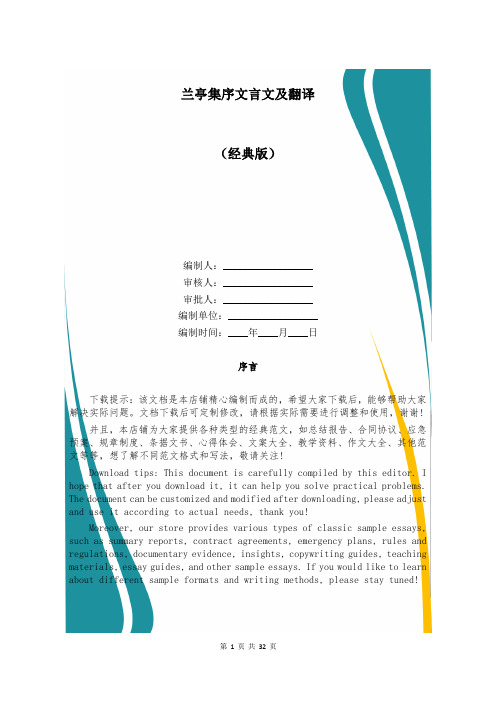
兰亭集序文言文及翻译(经典版)编制人:__________________审核人:__________________审批人:__________________编制单位:__________________编制时间:____年____月____日序言下载提示:该文档是本店铺精心编制而成的,希望大家下载后,能够帮助大家解决实际问题。
文档下载后可定制修改,请根据实际需要进行调整和使用,谢谢!并且,本店铺为大家提供各种类型的经典范文,如总结报告、合同协议、应急预案、规章制度、条据文书、心得体会、文案大全、教学资料、作文大全、其他范文等等,想了解不同范文格式和写法,敬请关注!Download tips: This document is carefully compiled by this editor. I hope that after you download it, it can help you solve practical problems. The document can be customized and modified after downloading, please adjust and use it according to actual needs, thank you!Moreover, our store provides various types of classic sample essays, such as summary reports, contract agreements, emergency plans, rules and regulations, documentary evidence, insights, copywriting guides, teaching materials, essay guides, and other sample essays. If you would like to learn about different sample formats and writing methods, please stay tuned!兰亭集序文言文及翻译兰亭集序文言文及翻译漫长的学习生涯中,说起文言文,大家肯定都不陌生吧?文言文的特色是言文分离、行文简练。
《兰亭集序》原文和翻译

《兰亭集序》原文和翻译《兰亭集序》原文和翻译《兰亭序》是东晋代书法家王羲之撰文集序,下面是小编收集整理的《兰亭集序》原文和翻译,希望大家喜欢。
原文:永和九年,岁在癸丑,暮春之初,会于会稽山阴之兰亭,修禊事也。
群贤毕至,少长咸集。
此地有崇山峻岭,茂林修竹,又有清流激湍,映带左右。
引以为流觞曲水,列坐其次,虽无丝竹管弦之盛,一觞一咏,亦足以畅叙幽情。
是日也,天朗气清,惠风和畅。
仰观宇宙之大,俯察品类之盛,所以游目骋怀,足以极视听之娱,信可乐也。
夫人之相与,俯仰一世。
或取诸怀抱,晤言一室之内;或因寄所托,放浪形骸之外。
虽趣舍万殊,静躁不同,当其欣于所遇,暂得于己,快然自足,不知老之将至;及其所之既倦,情随事迁,感慨系之矣。
向之所欣,俯仰之间,已为陈迹,犹不能不以之兴怀,况修短随化,终期于尽!古人云,“死生亦大矣。
”岂不痛哉!每览昔人兴感之由,若合一契,未尝不临文嗟悼,不能喻之于怀。
固知一死生为虚诞,齐彭殇为妄作。
后之视今,亦犹今之视昔。
悲夫!故列叙时人,录其所述。
虽世殊事异,所以兴怀,其致一也。
后之览者,亦将有感于斯文。
翻译:永和九年,即癸丑年。
暮春三月初,名士们在会稽郡山阴县的兰亭聚会,为的是到水边进行消灾求福活动。
众多的贤能之士都来参加,年轻的年长的都聚集在一起。
这地方有高山峻岭,茂密的树林和挺拔的翠竹,又有清澈的溪水,急泻的湍流,波光辉映萦绕在亭子左右。
把水引来作为飘流酒杯的弯曲水道,大家列坐在水边,虽然没有音乐伴奏而稍显冷清,可是一面饮酒一面赋诗,也足以酣畅地抒发内心的感情。
这天天气晴朗,空气清新,和风拂拂,温暖舒畅。
抬头仰望宇宙空间之广大,低首俯察万物种类之繁多,因而放眼纵览,舒展胸怀,也足以尽情享受所见所闻的乐趣,确实是很快活的啊。
人们彼此相处,一生很快就度过。
有的人襟怀坦荡,在家里与朋友倾心交谈;有的人把情趣寄托在某些事物上,不受世俗礼法拘束而纵情游乐。
虽然人们对生活的取舍千差万别,性情也有沉静和急躁的差异,但当他们遇到欢欣的事情,心里感到暂时的得志,就喜悦满足,竟没想到人生衰老的暮年会很快来临。
小学英语经典诗歌《兰亭集序》林语堂英译文欣赏素材

兰亭集序It is the ninth year of Yonghe (A.C.353), also known as the year of Guichou in terms of the Chinese lunar calendar.On one of those late spring days, we gather at the Orchid Pavilion, which is located in Shanyin County, Kuaiji Prefecture, for dispelling bad luck and praying for good fortune.The attendees of the gathering are all virtuous intellectuals, varying from young to old. Endowed with great mountains and lofty peaks, Orchid Pavilion has flourishing branches and high bamboo bushes all around, together with a clear winding brook engirdled, which can thereby serve the guests by floating the wine glasses on top for their drinking. Seated by the bank of brook, people will still regale themselves right by poetizing their mixed feelings and emotions with wine and songs, never mind the absence of melody from string and wind instruments.永和九年,岁在癸(guǐ〕丑。
林语堂翻译《兰亭集序》双语

林语堂翻译《兰亭集序》双语来我们一起读书,来学习多一点知识吧!接下来,小编给大家准备了林语堂翻译《兰亭集序》双语,欢迎大家参考与借鉴。
林语堂翻译《兰亭集序》双语It is the ninth year of Yonghe (A.C.353), also known as the year of Guichou in terms of the Chinese lunar calendar.On one of those late spring days, we gather at the Orchid Pavilion, which is located in Shanyin County, Kuaiji Prefecture, for dispelling bad luck and praying for good fortune.The attendees of the gathering are all virtuous intellectuals, varying from young to old. Endowed with great mountains and lofty peaks, Orchid Pavilion has flourishing branches and high bamboo bushes all around, together with a clear winding brook engirdled, which can thereby serve the guests by floating the wine glasses on top for their drinking. Seated by the bank of brook, people will still regale themselves right by poetizing their mixed feelings and emotions with wine and songs, never mind the absence of melody from string and wind instruments.永和九年,岁在癸(guǐ)丑。
兰亭序原文及翻译

兰亭序原文及翻译《兰亭序》又称为《兰亭集序》,是王羲之的一篇作品,记叙的聚会的欢乐之情。
下面是由小编为大家整理的“兰亭序原文及翻译”,仅供参考,欢迎大家阅读。
兰亭序原文永和九年,岁在癸丑,暮春之初,会于会稽山阴之兰亭,修禊事也。
群贤毕至,少长咸集。
此地有崇山峻岭,茂林修竹;又有清流激湍,映带左右,引以为流觞曲水,列坐其次。
虽无丝竹管弦之盛,一觞一咏,亦足以畅叙幽情。
是日也,天朗气清,惠风和畅,仰观宇宙之大,俯察品类之盛,所以游目骋怀,足以极视听之娱,信可乐也。
夫人之相与,俯仰一世,或取诸怀抱,悟言一室之内;或因寄所托,放浪形骸之外。
虽趣舍万殊,静躁不同,当其欣于所遇,暂得于己,快然自足,不知老之将至。
及其所之既倦,情随事迁,感慨系之矣。
向之所欣,俯仰之间,已为陈迹,犹不能不以之兴怀。
况修短随化,终期于尽。
古人云:“死生亦大矣。
”岂不痛哉!(不知老之将至一作:曾不知老之将至)每览昔人兴感之由,若合一契,未尝不临文嗟悼,不能喻之于怀。
固知一死生为虚诞,齐彭殇为妄作。
后之视今,亦犹今之视昔。
悲夫!故列叙时人,录其所述,虽世殊事异,所以兴怀,其致一也。
后之览者,亦将有感于斯文。
兰亭序翻译永和九年,即癸丑年,三月之初,(名士们)在会稽郡山阴县的兰亭聚会,为的是到水边进行消灾求福的活动。
许多有声望有才气的人都来了,有年轻的,也有年长的。
这里有高大的山和险峻的岭,有茂密的树林和高高的竹子,又有清水急流,(在亭的)左右辉映环绕。
把水引到(亭中)的环形水渠里来,让酒杯飘流水上(供人们取饮)。
人们在曲水旁边排列而坐,虽然没有管弦齐奏的盛况,(可是)一边饮酒一边赋诗,也足以痛快地表达各自幽雅的情怀。
这一天,天气晴朗,和风轻轻吹来。
向上看,天空广大无边,向下看,地上事物如此繁多,这样来纵展眼力,开阔胸怀,穷尽视和听的享受,实在快乐啊!人们彼此相处,一生很快就度过。
有的人喜欢讲自己的志趣抱负,在室内(跟朋友)面对面地交谈;有的人就着自己所爱好的事物寄托情怀,不受任何约束,放纵地生活。
- 1、下载文档前请自行甄别文档内容的完整性,平台不提供额外的编辑、内容补充、找答案等附加服务。
- 2、"仅部分预览"的文档,不可在线预览部分如存在完整性等问题,可反馈申请退款(可完整预览的文档不适用该条件!)。
- 3、如文档侵犯您的权益,请联系客服反馈,我们会尽快为您处理(人工客服工作时间:9:00-18:30)。
《兰亭集序》林语堂版英译文
来源:
It is the ninth year of Yonghe (A.C.353), also known as the year of Guichou in terms of the Chinese lunar calendar.On one of those late spring days, we gather at the Orchid Pavilion, which is located in Shanyin County, Kuaiji Prefecture, for dispelling bad luck and praying for good fortune.The attendees of the gathering are all virtuous intellectuals, varying from young to old. Endowed with great mountains and lofty peaks, Orchid Pavilion has flourishing branches and high bamboo bushes all around, together with a clear winding brook engirdled, which can thereby serve the guests by floating the wine glasses on top for their drinking. Seated by the bank of brook, people will still regale themselves right by poetizing their mixed feelings and emotions with wine and songs, never mind the absence of melody from string and wind instruments.
永和九年,岁在癸(guǐ)丑。
暮春之初,会于会(kuài)稽山阴之兰亭,修禊(xì)事也。
群贤毕至,少长(zhǎng)咸集。
此地有崇山峻岭,茂林修竹,又有清流激湍,映带左右,引以为流觞(shāng)曲水,列坐其次。
虽无丝竹管弦之盛,一觞一咏,亦足以畅叙幽情。
It is such a wonderful day, with fresh air and mild breeze.Facing upwards to the blue sky, we behold the vast immensity of the universe; when bowing our heads towards the ground, we again satisfy ourselves with the diversity of species.Thereby we can refresh our views and let free our souls, with luxuriant satisfaction done to both ears and eyes. How infinite the cheer is!
是日也,天朗气清,惠风和畅。
仰观宇宙之大,俯察品类之盛。
所以游目骋(chěng)怀,足以极视听之娱,信可乐也。
People keep coming and going, and life soon rushes to its end. Some people prefer to share their proud aspiration and lofty goals with close friends indoors, while some others choose to follow their interest and free their minds wherever and
whenever they like. May characters vary from person to person, or some would rather stay peaceful while others like to live restlessly, they will all become delighted and satisfied once they meet something pleasant, so cheerful that they get unaware of their imminent old age.However, when they get tired of their old fancies that they’ve already experienced, and sentiment correspondingly accompanies the change of situation, all sorts of complicated feelings will well up in the heart, too. Isn’t it thought-provoking that the happiness we used to enjoy passes by without leaving a single trace, let alone that the length of life is subject to the fate, and death is inevitable for anybody in the end? Just as some ancient man once put it, “Death also deserves our attention, like what life does.”, so how can we restrain ourselves from grieving?
夫(fú)人之相与,俯仰一世。
或取诸怀抱,悟言一室之内;或因寄所托,放浪形骸之外。
虽趣(qǔ)舍万殊,静躁不同,当其欣于所遇,暂得于己,快然自足,不知老之将至;及其所之既倦,情随事迁,感慨系之矣。
向之所欣,俯仰之间,已为陈迹,犹不能不以之兴怀,况修短随化,终期于尽!古人云:“死生亦大矣”,岂不痛哉!
Every time I ponder about the reasons why our predecessors would produce works with such inenarrable emotions, I find there seem some similarities between our minds. Yet I cannot help lamenting their literary masterpieces while I am struggling for the very cause in my innermost world. Now I come to realize that it has been ridiculous for me to equate death with life, long life with short life . The descendents view us just the way we look at our predecessors, and how woeful it is! Hence I write down all the names of the attendees and put their poetry into record. Conditions may go with the changes of time, but people’s emotions shall stay the same. I believe the following readers will still have much to mediate about life and death when appreciating this poetry anthology.
每览昔人兴感之由,若合一契,未尝不临文嗟悼(jiē dào),不能喻之于怀。
固知一死生为虚诞,齐彭殇(shāng)为妄作。
后之视今,亦犹今之视昔,悲夫!故列叙时人,录其所述,虽世殊事异,所以兴怀,其致一也。
后之览者,亦将有感于斯文。
来源:外研社。
